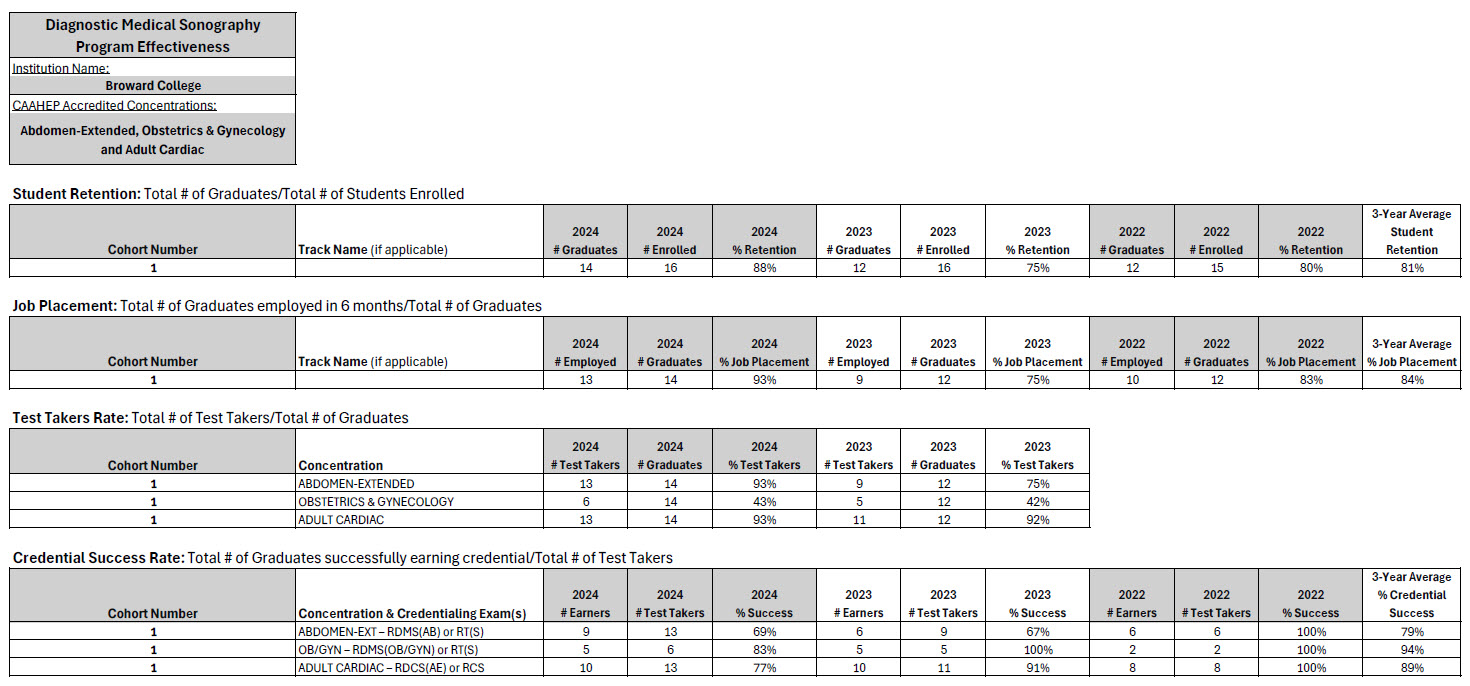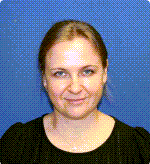Diagnostic Medical Sonography
Associate of Science
Accessibility Options: Skip to Content Skip to Search Skip to Footer Institutional Accessibility Open Alternative Formats for this page
Accessibility Options: Skip to Content Skip to Search Skip to Footer Institutional Accessibility Open Alternative Formats for this page
Associate of Science
During COVID-19, most clinical affiliates mandated vaccinations for all students attending clinical externships at off-campus sites. This was a clinical affiliate requirement and not a Broward College requirement, and declining the COVID-19 vaccination prevented students from completing their program of study. At this time, clinical affiliates do not have mandatory COVID-19 vaccination requirements. Clinical affiliates currently mandate the Flu vaccine and could reinstate the COVID-19 vaccination requirements at any time and if so, students will be required to have the COVID-19 vaccine to attend clinical rotations, allowing them to progress in their program of study.
Diagnostic medical sonography, more commonly referred to as ultrasound, is a growing area of the healthcare sector with excellent job prospects. Sonographers are skilled clinicians who perform ultrasound studies as ordered by physicians for their patients. The images created by sonographers are then used to determine a medical diagnosis. Broward College offers:
AS Diagnostic Medical Sonography Programs of Study
The Diagnostic Medical Sonography program prepares individuals meeting certain qualifications to work with medical practitioners in the management, control, and care of patients referred for ultrasound studies.
Broward College offers an affordable educational experience for anyone interested in a career as an ultrasound clinician. See how our program is structured and what it can do for your future.
Program Courses must be completed with a 'C' grade or better
Award Type: Associate of Science degree
Program Number: 2176
Campus Offered: North
Program Type: Limited Access
Begins in June
APPLICATION PERIOD: November 1 to March 15
IMPORTANT NOTE:
Currency of Prerequisite Coursework
Beginning with the application periods for the May, June and August 2026 cohorts: All applicants to the Health Science programs must have successfully completed the required mathematics and science prerequisite courses within the ten (10) years preceding the application submission date. This policy ensures that students enter the program with up-to-date knowledge essential for success in the current curriculum.
Applicants who have completed prerequisite coursework more than ten years prior to the application date are required to retake the relevant courses to meet this requirement. If the science and math courses are older than 10 years, please see an academic advisor to determine eligibility to retake the courses at Broward College. Exceptions to this policy are not permitted.
2025 - 2026 Application Criteria (must be completed before applying to program)
Program Courses must be completed with a minimum grade of 'C'
More information regarding the civic literacy requirement can be found on the Civic Literacy Graduation Requirement site.
All courses must have a grade of 'C' or better. GPA must meet the minimum required to apply.
Submission of an application does not guarantee admission.
2025 - 2026 Admissions Selection Criteria
Preference is given to students who have completed a 2-year Radiography program. Points will be awarded in several categories including completion of general education courses, GPA, and previous educational experience.
Max Points: 60
| Overall GPA | Points |
|---|---|
| 4.0 to 3.75 | 4 |
| 3.74 to 3.50 | 3 |
| 3.49 to 3.0 | 2 |
| 2.99 to 2.5 | 1 |
| Course | A | B | C |
|---|---|---|---|
| PHY1001 or RTE2385** | 3 | 2 | 1 |
| MAC1105 or MAC1105C ONLY | 3 | 2 | 1 |
| ENC1101 | 3 | 2 | 1 |
| SPC1017 OR SPC1608 | 3 | 2 | 1 |
| BSC2085 | 3 | 2 | 1 |
| BSC2085L | 3 | 2 | 1 |
| BSC2086 | 3 | 2 | 1 |
| BSC2086L | 3 | 2 | 1 |
| POS2041 or AMH2020 only | 3 | 2 | 1 |
| CORE HUMANITIES ELECTIVE | 3 | 2 | 1 |
**Please note: RTE2385 is only for students who have graduated from a Radiography program.
| Degree | Points |
|---|---|
| Radiography (AS) | 20 |
| AS in Health Science (Leads to Licensure with patient care) | 17 |
| MA/MS or higher | 15 |
| BA/BS Degree | 10 |
| AA/AS Degree | 5 |
Please note: To receive 17 points for an AS degree in a health science field, the degree must have led to licensure in patient care (AS in Nursing, AS in Nuclear Medicine, AS in Radiation Therapy, AS in Vision Care, etc.)
AS degrees in Health Science (such as the AS in Health Navigator) that do not lead to licensure with patient care will be awarded 5 points.
Points are awarded for the highest degree earned, not all degrees.
Military Service Points are awarded to applicants who are Active Duty or Honorably Discharged Veterans of the US Armed Forces.
| Applicant | Points |
|---|---|
| Military Service | 5 |
One point will be awarded for the completion of Medical Terminology (3 credit course)-Not required to apply
| HSC1531 | 1 point |
In the event of a point tie, the overall GPA will be used as the tiebreaker.
Currency of Prerequisite Coursework
Beginning with the application periods for the May, June and August 2026 cohorts: All applicants to the Health Science programs must have successfully completed the required mathematics and science prerequisite courses within the ten (10) years preceding the application submission date. This policy ensures that students enter the program with up-to-date knowledge essential for success in the current curriculum.
Applicants who have completed prerequisite coursework more than ten years prior to the application date are required to retake the relevant courses to meet this requirement. If the science and math courses are older than 10 years, please see an academic advisor to determine eligibility to retake the courses at Broward College. Exceptions to this policy are not permitted.
Additional Information:
Number of Accepted Students
June 2025: 21 accepted
Required admissions criteria courses shown in the application criteria MAY NOT be covered by Financial Aid.
For more information on the Diagnostic Medical Sonography (AS) program, please visit the DMS Program site or review the DMS AS FAQ section.
Once you determine that you meet this program's prerequisites, you may submit a program application.
Updated: JULY 2025
The college reserves the right to change any of the rules and regulations of the Health Science Department at any time, including those related to admission, instruction, and graduation. All such changes are effective at such times as the proper authorities determine and may apply not only to prospective students but also to those who already are enrolled in a Health Science Program. All enrolled students will be notified in writing of such changes as they occur.
In Health Science programs, a retracker is a student whose progression has been interrupted because of course failure, withdrawal, or personal circumstances and who is later approved to re-enter the program in a future term.
Students seeking to retrack into the Health Science programs must adhere to the following guidelines:
2. Approval Process
3. Limitations

Sonographers create images of various structures inside the human body using specialized equipment. As a student in the diagnostic medical sonography program here at Broward College, you will learn:
All semesters are taught in the classroom and at clinical affiliates. Classes are capped at 18 to 20 students thereby offering more one-on-one time with your didactic and clinical instructors. Clinical education courses allow the experience of hands-on sonography training in local hospitals and clinics.
Our faculty will work closely with you to ensure your success in the program by offering constructive critique as you apply what you learn.
Quick Video: BC Diagnostic Medical Sonography Program
The U.S. Department of Labor and Bureau of Labor Statistics indicates that the employment of diagnostic medical sonographers is expected to increase by almost 14 percent through 2018-2028, which is faster than the average for all occupations. In addition, the aging population will only increase the demand for diagnostic medical sonographers.
Graduates of our program have found work in:
Browse CollegeCentral.com Sonography Jobs
Browse Ultrasoundjobs.com Ultrasound Jobs
Browse SDMS.org Ultrasound Jobs
As a student in our Diagnostic Medical Sonography program, and later as a professional working in the field, a number of personal qualities will be vital to your success. These include:
Your experience in the field after you graduate will include:
Faculty and instructors consist of sonographers who have more than 35 years of combined experience in the health care and sonography fields. All faculty members a graduates of this program. The faculty's many years of real-world experience facilitate learning for all Broward College Diagnostic Medical Sonography students.
Evan Steigrod, Program Manager/Instructor

Tatsiana Kandratsenka, Clinical Coordinator/ Instructor

Lauren Nash, Adjunct Instructor
In just 24 months or six semesters (for a total of 77 credits), you could earn your AS in Diagnostic Medical Sonography. Courses are only available at the North Campus, with General Education courses available at all campus locations. When you enroll in this program, your courses will include:
A typical semester involves two full days of class and three eight-hour clinic days. This is a full-time program that requires approximately 34 hours per week of your time (not evenings or weekends). You must complete courses in the sonography track with a grade of "C" or better. A GPA of 2.0 or above is required for graduation.
Program Description
The Diagnostic Medical Sonography Program prepares individuals meeting certain qualifications to work with medical practitioners in the management, control, and care of patients referred for ultrasound studies. The Broward College Diagnostic Medical Sonography Program is accredited by the Commission on Accreditation of Allied Health Education Programs (CAAHEP) upon the recommendation of the Joint Review Committee on Education in Diagnostic Medical Sonography (JRC-DMS).
CAAHEP
9355-113th St. N, #7709
Seminole, FL 33775
727-210-2350
www.caahep.org
JRC-DMS
6021 University Blvd.
Suite 500
Ellicott City, MD 21043
443-973-3251
www.jrcdms.org
Clinical education is performed in local clinics/hospitals and is offered concurrently with the didactic courses. On completion of the 24-month program, students will be eligible to apply to sit for the exams of the American Registry of Diagnostic Medical Sonographers.
Applicants should access admission information online or call 954-201-2892. Applicants may call the Program Manager at 954-201-2089 for all specific program admissions-related questions.
All didactic courses are taught in Building 41, Broward College, North Campus, 1000 Coconut Creek Boulevard, Coconut Creek Florida. Clinical affiliation sites are located throughout Broward and Palm Beach counties.
To qualify for admission to the Associate of Science (AS) degree program. applicants must meet the following requirements:
To prepare competent entry-level sonographers in the cognitive (knowledge), psychomotor (skills), and affective (behavior) learning domains for the following concentrations:
This program is designed to develop a sonographer who:
Transforming students' lives and enriching our diverse community through academic excellence, innovation, and meaningful career opportunities.
The mission of the Diagnostic Medical Sonography Program is to prepare competent, ethical, and culturally sensitive entry-level sonographers who are dedicated to lifelong self-directed learning. The program is committed to preparing sonographers who are capable of functioning in a dynamic and ever-changing area of health care delivery. The Sonography Program exists to provide technical and professional education to benefit all segments of the community. The Sonography Program is committed to quality instruction delivered by dedicated faculty who are engaged in continued professional development.
The program is committed to accomplishing its mission through the use of effective and diverse instructional methods that encompass both traditional and technology-based strategies. The program's goal is to prepare competent entry-level general and cardiac sonographers in the cognitive (knowledge), psychomotor (skills), and affective (behavior) learning domains. The program is offered on a full-time basis only with classes and clinical education held during the day. All Diagnostic Medical Sonography Classes are taught at Broward College's North Campus. Clinical Education is provided through various clinical affiliates in Broward County.
To successfully progress through the Sonography Program, students must achieve all cognitive, affective, and psychomotor objectives. This requires that a grade of "C" or above be earned in all didactic courses and an "S" (satisfactory) grade be earned in all clinical courses. This requirement is in addition to maintaining an overall degree GPA of at least 2.0. All courses in the program are sequential. Each course must be passed with a grade of "C" or better to progress to the next scheduled course.
Please read on to find out more about the ways our program can help you to meet your academic and career goals. Our goal is to help you succeed.
The Diagnostic Medical Sonographer utilizes high-frequency sound waves and other diagnostic techniques for medical diagnosis. The professional level of this health care service requires highly skilled and competent individuals who function as integral members of the health care team. The Diagnostic Sonographer must be able to produce and evaluate ultrasound images and related data that are used by physicians to render a medical diagnosis. The Diagnostic Sonographer must acquire and maintain specialized technical skills and medical knowledge to render quality patient care.
In the professional courses that are required, as well as in the career field of sonography, the student and sonographer must have the ability to:
Preamble:
The purpose of this document is to define the Scope of Practice for Diagnostic Ultrasound Professionals and to specify their roles as members of the healthcare team, acting in the best interest of the patient. This scope of practice is a "living" document that will evolve as the technology expands.
Definition of the Profession:
The Diagnostic Ultrasound Profession is a multi-specialty field comprised of Diagnostic Medical Sonography (with subspecialties in abdominal, neurologic, obstetrical/gynecologic, and ophthalmic ultrasound), Diagnostic Cardiac Sonography (with subspecialties in adult and pediatric echocardiography), Vascular Technology, and other emerging fields. These diverse specialties are distinguished by their use of diagnostic medical ultrasound as a primary technology in their daily work. Certification1 is considered the standard of practice in ultrasound. Individuals who are not yet certified should reference the Scope as a professional model and strive to become certified.
Scope of Practice of the Profession:
The Diagnostic Sonographer is a highly skilled individual qualified by academic and clinical experience to provide diagnostic patient services using ultrasound and related diagnostic techniques. The Diagnostic Sonographer is responsible for producing the best diagnostic information possible with the available resources. Diagnostic Sonographer acquires and evaluates data while exercising discretion and judgment in the performance of the clinical examination. The Diagnostic Sonographer can:
1 An example of credentials: RDMS (registered diagnostic medical sonographer), RDCS (registered diagnostic cardiac sonographer), RVT (registered vascular technologist); awarded by the American Registry of Diagnostic Medical Sonographers®, a certifying body with NCCA Category "A" membership.
2 Credentials should be awarded by an agency certified by the National Commission for Certifying Agencies (NCCA).
Copyright © 1993-2000 Society of Diagnostic Medical Sonography Dallas, TexasUSA All Rights Reserved Worldwide
Program Manager
Evan Steigrod
esteigro@broward.edu
Clinical Site Coordinator
Tatsiana Kandratsenka
tkandrat@broward.edu
Health Science Advisor
Marilyn Rule
mrulehei@broward.edu
BROWARD COLLEGE SACSCOC ACCREDITATION STATEMENT
Broward College is accredited by the Southern Association of Colleges and Schools Commission on Colleges (SACSCOC) to award Associate in Arts, Associate in Science, Associate in Applied Science, Bachelor of Science, and Bachelor of Applied Science degrees. Broward College also may offer credentials such as certificates and diplomas at approved degree levels. Questions about the accreditation of Broward College may be directed in writing to the Southern Association of Colleges and Schools Commission on Colleges at 1866 Southern Lane, Decatur, GA 30033-4097, by calling 404-679-4500, or by using information available on SACSCOC's website (www.sacscoc.org).
The Diagnostic Medical Sonography Program offered by Broward College is accredited by the Commission on Accreditation of the Allied Health Education Program (CAAHEP)
9355 113th St. N, #7709
Seminole, FL 33775
Upon the recommendation of The Joint Review Committee on Education in Diagnostic Medical Sonography (JRC-DMS).
6021 University Blvd.
Suite 500
Ellicott City, MD 21043
Broward College Health Science Admissions staff may be contacted by email at healthscience@broward.edu.
North Campus
Building 46 | Room 252
1000 Coconut Creek Blvd.
Coconut Creek, FL 33066
Central Campus
Building 8 | Room 130
3501 Davie Road
Davie, FL 33314

Applying for aid is not difficult, but the application does take some focused time. The rewards are worth it. These funds can change your life.

Unlike loans, you do not have to pay scholarship money back. Broward College has limited scholarships for merit, financial need, degree choice, and more.
Get Started Today
A BC degree checks all the boxes. If this program is your goal, get started toward becoming a student today.
This site is best viewed in a modern browser and is not compatible with Internet Explorer (IE). Please use another browser, such Chrome, Safari, Edge, or Firefox for the best user experience.